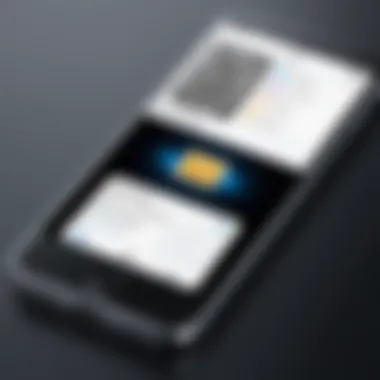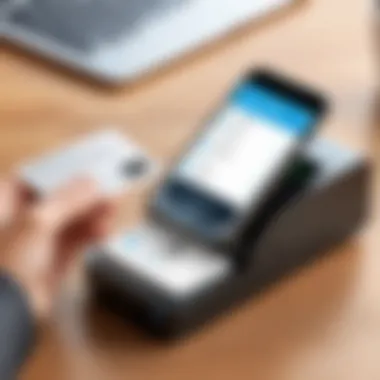Exploring iPhone Business Card Scanner Apps


Intro
Business card scanner apps have become essential tools for professionals. In an era where networking is invaluable, these applications help streamline the exchange of contact information. They convert physical business cards into digital formats, making it easier to store, manage, and access contacts. With iPhone's capabilities, users can enjoy seamless integration and user-friendly experiences.
Overview of Software
Purpose and Use Cases
The primary purpose of business card scanner apps is to simplify contact management. Users can capture details from physical cards quickly, eliminating the need for manual entry. This is particularly useful for professionals who attend conferences and networking events frequently. Instead of juggling multiple business cards, users can simply scan and store them on their devices. These apps cater not only to entrepreneurs but also to salespeople, job seekers, and students.
Key Features
Business card scanner apps offer a range of features that enhance their functionality:
- Optical Character Recognition (OCR): This technology allows apps to recognize and digitize text from scanned cards.
- Cloud Storage: Many apps permit users to save contacts online, ensuring accessibility across devices.
- Custom Tags: Users can categorize contacts by tagging them for easier retrieval.
- Integration with Contacts App: Most applications enable direct syncing with the iPhone contacts list.
- Data Export Options: Users can export contact lists to various formats.
In-Depth Review
Performance Analysis
When considering performance, factors such as scanning speed and accuracy become key. Leading apps like CamCard and ScanBizCards show impressive scanning capabilities with high recognition rates. The apps' ability to process diverse card designs without errors is significant for user satisfaction.
User Interface and Experience
A clean user interface greatly affects usability. The ideal app should present features clearly and allow for easy navigation. Users expect intuitive layouts that simplify the scanning process. Feedback from users often highlights the importance of a seamless experience, which keeps them engaged with the tool. Localization plays a role too; apps that support multiple languages often see wider adoption.
"The convenience of having digital access to my contacts has transformed my networking strategy. It saves time and minimizes loss of information."
In summary, business card scanner apps present a blend of efficiency and innovation in contact management. Their evolution continues to adapt to the needs of users, ensuring they remain relevant in today's fast-paced professional world.
Prolusion to Business Card Scanning
Business card scanning is a technology that streamlines the management of professional connections. The traditional method of collecting physical business cards becomes limiting in our fast-paced digital world. Business card scanner apps for iPhone negate these limitations by providing a convenient way to store and organize contact information. The rise of networking opportunities requires efficient tools to keep track of relationships, making these apps increasingly relevant.
The Importance of Digital Business Card Management
Digital business card management offers multiple advantages. Firstly, it enhances accessibility. With apps, users can retrieve contact information instantly, eliminating the need to sort through a pile of cards. Secondly, these tools often include search features. Users can find contacts based on names, companies, or other keywords. This functionality saves time and improves productivity.
Moreover, there is the benefit of reduced risk of data loss. Physical cards can be damaged or misplaced. Yet, digital records can be backed up and synced across devices, ensuring that information remains safe and retrievable. Additionally, business card scanner apps frequently allow for data normalization, reducing discrepancies and errors in the contact details.
Overall, the switch to digital management transforms how individuals can network. Success in today’s business landscape relies on the effectiveness of these tools, leading to the necessity of understanding their features and functions.
How Business Card Scanners Work
Business card scanners employ Optical Character Recognition (OCR) technology. This tool captures the text visible on a business card. The scanning process begins with users taking a photograph of the card with their iPhone. The app then analyzes the image to extract information such as names, addresses, phone numbers, and emails.
Once the data is extracted, it is converted into a digital format. OCR engines read the text and identify relevant fields. For instance, a standard business card typically has name and title on the front and contact details on the back. The technology organizes this information accordingly, linking names with appropriate titles and contact numbers.


While many apps use OCR capabilities, the accuracy of extraction can vary. Quality of the image, font styles, and layout affect recognition rates. Some advanced apps also learn from user corrections, improving their accuracy over time. Therefore, understanding the basic working of these scanners helps users choose the right app based on their specific needs and expectations.
Features to Look for in a Business Card Scanner App
When evaluating business card scanner apps for iPhone, certain features stand out as critical in enhancing user experience and functionality. Selecting the right app can lead to a more efficient networking process, where managing contacts becomes seamless. This section will detail the key features that enhance the application's utility.
Optical Character Recognition (OCR) Technology
Optical Character Recognition is one of the most vital features in any business card scanning app. This technology converts different types of documents, such as scanned paper documents, PDFs, or images captured by a camera, into editable and searchable data. An advanced OCR system should accurately read a variety of fonts and formats. This accuracy is essential because any misreading can lead to confusion or loss of important information. Moreover, a good OCR technology should work well with cards that have complex layouts or varying designs. Ultimately, the reliability of OCR impacts how well a user can manage their contact list.
Integration with Contact Management Systems
Another significant feature to consider is the integration capability with contact management systems. Many professionals use various apps to manage their contacts, such as Google Contacts or Microsoft Outlook. Having a scanner that can seamlessly integrate with these platforms can save time and eliminate redundancies. The integration process should be simple, allowing users to sync data with minimal hassle. This smooth workflow ensures that all critical contact information is updated across all platforms in real time, reducing the chance for error.
User-Friendly Interface
The user experience of the app depends heavily on its interface. A user-friendly interface allows individuals, regardless of tech-savviness, to navigate the app effortlessly. Features such as intuitive design, clear visual cues, and easy access to functionalities play a significant role in usability. A well-structured interface reduces the learning curve needed to effectively use the app. As a result, users can focus more on networking rather than figuring out how to operate the tool. Clear segmentation of different functions within the app also enhances user engagement and satisfaction.
Data Export Options
In today’s data-driven world, flexibility in managing contacts is essential. Therefore, robust data export options are necessary for any business card scanner app. Users should have the ability to export contact information in various formats, such as CSV or vCard. This capability allows easy import into other applications or sharing with colleagues. Additionally, options for cloud storage integration can add to the app’s appeal, providing users with a secure way to archive their contacts. A reliable app will facilitate not just the scanning, but also the effective organization and dissemination of contact information.
Businesses rely on networking. The right tools can enhance how connections are built and maintained.
For users—especially software developers and IT professionals—these features resonate because they streamline their workflow. Selecting an app with the right combination of these features can significantly improve management of professional relationships.
Popular Business Card Scanner Apps for iPhone
The rise of digital business card management tools has transformed how professionals exchange contact information. Business card scanner apps for iPhone facilitate this process by allowing users to capture card details and manage contacts efficiently. They combine functionality with convenience, streamlining networking in a fast-paced business world.
Choosing the right app is essential for maximizing productivity. Features vary across different options, affecting usability, accuracy, and integration capabilities. A well-chosen app can simplify storing and retrieving contacts, saving time and reducing manual entry errors. The increasing reliance on digital communication makes these apps not just handy but necessary for effective networking.
CamCard: Features and Pricing
CamCard is a widely recognized business card scanner app that offers a comprehensive set of features. One significant aspect is its Optical Character Recognition (OCR) technology, which allows for the accurate extraction of contact information from scanned cards. Users can edit details directly within the app before saving them to their address book.
CamCard offers multi-device syncing, allowing users to access their cards from various platforms, which is beneficial for professionals on the go. As for pricing, it has a free version with basic features, while premium subscriptions unlock advanced capabilities. Pricing tiers range from $5.99 per month to around $39.99 per year, making it a cost-effective solution for heavy users.
ABBYY Business Card Reader: Overview
ABBYY Business Card Reader distinguishes itself through superior OCR capabilities. This app supports multiple languages and can convert scanned text into digital entries with impressive accuracy. ABBYY also provides options to customize fields, enabling users to categorize information according to their needs.
The interface is clean and intuitive, which enhances user experience. ABBYY’s cloud synchronization ensures that contacts are backed up and accessible across devices. Additionally, it offers a straightforward pricing model, with a one-time purchase of around $19.99 or a subscription at $4.99 monthly. This makes it a viable choice for professionals who require reliability and efficiency in capturing business cards.
ScanBizCards: Key Attributes
ScanBizCards is another robust contender in the market, catering to users who need more than just basic scanning functionalities. One of its standout features is the ability to generate vCards from scanned cards, allowing seamless sharing across different devices and platforms. Moreover, it allows users to add notes to contacts, providing the capability to remember specific details about connections.


In terms of integration, ScanBizCards works well with CRM systems such as Salesforce, which is a significant advantage for those in sales or marketing. It supports both free and paid versions, with premium features accessible through a $9.99 monthly subscription. This flexibility appeals to a diverse range of users, from freelancers to large teams.
Haystack: A Minimalist Approach
Haystack stands out with its minimalist interface. The app emphasizes ease of use, focusing on functionality without overwhelming users with too many options. It allows users to scan and share business cards with a few taps, streamlining the networking process.
Haystack also provides a unique digital business card feature, enabling users to create their profiles adaptable enough to share via email or social networks. It supports data entry through voice recognition, adding to its versatility. As for cost, Haystack offers a free version with essential features, while premium options start at about $5 monthly. This makes it a good fit for minimalists who still want effective scanning without complexity.
Concluding Thoughts on Popular Options
In assessing business card scanner apps, it becomes clear that each solution offers distinct advantages. CamCard excels in its comprehensive feature set and cross-platform syncing. ABBYY Business Card Reader stands out due to its exceptional OCR capabilities, while ScanBizCards appeals with corporate integration options.
Haystack, on the other hand, caters to users who prefer simplicity. The choice among these apps ultimately hinges on specific user needs, the intended use case, and budget considerations. By examining features and benefits, users can identify the most suitable business card scanner app for their iPhone.
User Experience and Reviews
User experience and reviews are crucial for any app, particularly for business card scanner apps on the iPhone. These applications serve a practical purpose, helping users manage their contacts efficiently. The effectiveness of these tools often depends on how they deliver their promises to users. In this section, we will discuss the pivotal elements that form user experience, the benefits of conducting thorough reviews and considerations that go into assessing usability in the context of these tools.
A well-designed application can streamline the process of capturing and organizing business card information. Users appreciate intuitive navigation, quick data entry, and seamless integration with other contact management systems. Additionally, understanding user feedback allows developers to enhance features, fix bugs, and stay relevant in an ever-evolving digital landscape. This constant feedback loop can lead to significant improvements in performance and usability.
Expert Analysis of Usability
Usability refers to how easy and enjoyable an application is to use. An expert analysis often focuses on specific usability metrics. These include:
- Learnability: How quickly can a new user understand how to use the app?
- Efficiency: Can users easily complete tasks in the app without unnecessary steps?
- Error Management: How well does the app handle mistakes?
Expert reviews of popular business card scanner apps typically highlight these aspects. For example, apps like CamCard and ABBYY Business Card Reader get commendations for their swift scanning and accuracy. However, some reviews point out issues with the OCR technology, suggesting that even minor design oversights can affect user satisfaction. Ultimately, experts prioritize features that elevate user experience and eliminate friction.
User Feedback: Strengths and Weaknesses
User reviews are invaluable for gauging the strengths and weaknesses of these applications. Users often share opinions on:
- Scanning Speed: Is the app fast enough for busy professionals?
- Accuracy of Data Capture: Does it correctly recognize the text on cards?
- Integration Options: How well does it sync with other applications like Google Contacts or LinkedIn?
Positive feedback usually revolves around performance and user interface. Users appreciate when apps work seamlessly without crashes or lags. On the downside, criticism often arises from privacy concerns and the accuracy of captured data. Users may express frustration if they find that the scanner misinterprets information frequently, resulting in spending extra time correcting errors.
"An app's success lies not just in its features, but also in how well it meets the expectations of its users."
In summary, analyzing user experience and feedback provides critical insights into business card scanner apps. Developers can make informed updates based on this information, ultimately enhancing the overall user journey. Understanding these aspects is essential for anyone looking to appreciate the full suite of options available for managing digital business cards.
Artificial Intelligence in Business Card Scanning
Artificial intelligence is transforming various aspects of technology, and business card scanning is no exception. The integration of AI in this domain can significantly enhance the way users interact with digital contact management. AI offers advantages such as improved accuracy, speed, and usability. As business professionals increasingly rely on digital tools for networking, understanding AI's role in business card scanning becomes vital.
The Role of AI in OCR Technology
Optical Character Recognition (OCR) technology is central to business card scanner apps. AI algorithms help improve OCR functionalities by enabling more precise recognition of text from business cards.


- Improved Accuracy: AI techniques can analyze patterns and learn from past experiences. This learning process allows them to distinguish between similar-looking characters and symbols, reducing recognition errors.
- Support for Multiple Languages: Advanced AI systems adapt to various languages and fonts, making them more useful in diverse business environments where language barriers might arise.
- Contextual Understanding: AI can assess the context around the data being captured. For example, it can determine that a certain string of text is a name, company name, or email based on surrounding information.
Businesses that utilize apps with sophisticated AI-driven OCR will find that their contact databases are more accurate and up-to-date, facilitating smoother networking and communication.
Future Prospects of AI-Driven Scanning Solutions
The future of AI in business card scanning presents exciting possibilities. As technology evolves, so do the capabilities of scanner apps.
- Enhanced Machine Learning Algorithms: These will allow future apps to continually improve based on user interactions, yielding ever more accurate data capture.
- Integration with Other Technologies: AI-driven scanning may integrate seamlessly with CRM systems and social media platforms, enabling further automation. Users might see their contacts automatically categorized or updated within a CRM based on interactions.
- Real-Time Translation: Imagine being able to scan a card in one language and have it instantly translated into your desired language within the app. This would enhance international networking by making connections easier and more straightforward.
- Personalized User Interfaces: Future apps could deliver more customized user experiences based on user preferences or habits. This might include setting preferred data formats or how to highlight certain types of information.
"The advancements in AI will not only change how we capture data but also how we interact with our connections."
Challenges and Limitations
While business card scanner apps offer clear advantages, it is essential to understand the challenges and limitations they present. Addressing these can help users make informed decisions in selecting the right tools for their networking needs. Two primary concerns dominate this section: the accuracy of data recognition and privacy issues associated with these applications.
Accuracy of Data Recognition
The accuracy of data recognition is fundamental to the functionality of business card scanner apps. This technology relies on Optical Character Recognition (OCR), which can vary significantly among different applications. Even the most sophisticated algorithms can misinterpret handwritten text or non-standard fonts. Factors such as lighting conditions and the quality of the card itself can further impact the precision of scanned information.
Inaccurate data recognition can lead to critical errors in contact information. For example, a wrong phone number or email can hinder communication, potentially resulting in missed business opportunities. Thus, users should remain vigilant, routinely verifying scanned data before transferring it to their contact lists or sharing it within their networks.
Here are some steps to enhance accuracy:
- Ensure the lighting is adequate and consistent when scanning.
- Use high-quality business cards with clear fonts.
- Regularly check settings or updates within the app to improve performance.
"Maintaining vigilance in data verification is key to effective networking, especially when relying on technological tools."
Privacy Concerns with Card Scanning Apps
With the rise of digital solutions comes the obligation to address privacy concerns. Users often worry about how their data is stored and shared. Business card scanner apps generally require access to users’ contacts and cameras, posing potential risks if misused.
Many applications may transmit user data to cloud services for processing. This can lead to unauthorized access if security measures are not robust. Therefore, it is imperative to conduct thorough research into the app's policies regarding data security and user privacy. Users should check for:
- Clear data handling policies.
- Strong encryption methods for stored and transmitted data.
- Third-party app connections that may access user information.
In unlocking the benefits of these apps, users must balance efficiency with caution. By being proactive about privacy, individuals can utilize business card scanners effectively, minimizing their exposure to potential risks.
Finale
Business card scanner apps play a critical role in how professionals manage and organize their contacts in today’s fast-paced business environment. These applications are designed to streamline the process of collecting and storing contact information, thus enhancing networking efficiency. As discussed in this article, they utilize advanced technologies like Optical Character Recognition and artificial intelligence to improve data accuracy and user experience.
Final Thoughts on Business Card Scanner Apps
The evolution of business card scanner apps represents a significant advancement in digital networking solutions. They not only offer a convenient way to store and retrieve contact information but also contribute to the overall simplification of professional interactions. The implementation of AI technologies signifies a leap towards intelligent data management. As individuals become increasingly reliant on mobile technology, these apps will likely become indispensable for effective networking.
Recommendations for Users
When selecting a business card scanner app, users should consider several factors to ensure they choose the best option for their needs. Here are some recommendations:
- Evaluate OCR Accuracy: Prioritize apps that provide robust OCR capabilities for better recognition of varied business card layouts.
- Check Integration Features: Look for compatibility with existing contact management systems to maintain a seamless workflow.
- Assess User Reviews: Seek insights from other users to understand the strengths and weaknesses of different apps.
- Examine Data Privacy Policies: Awareness of how your data will be stored and used is crucial for protecting privacy.
In summary, the right business card scanner app can significantly enhance networking productivity. By considering features and user feedback, professionals can find a solution that meets their requirements effectively.







